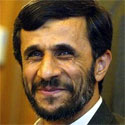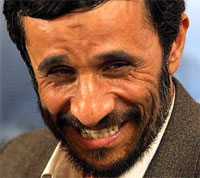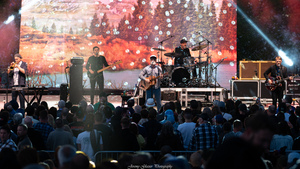
Nuclear Options
War in Iran – more of the same.
by Shelton Hull
After the last three years, many of you may be amazed that the Administration is possibly leaning toward military action in a nation with many times the population of Iraq and few curbs on the building-up of their arsenal over the years. Americans may be shocked that the media, like they did before, has embraced the fallacies and nonsense underlying the pro-war position with nary a word in rebuttal. They may be confused that the opposition is looking kind of slap-dash, compared to the institutions supporting the action.
To the extent that anyone is willing to speculate about when this activity could officially start, consensus leads toward March. IAEA head Mohammed El-Baradei (a former Nobel Peace laureate) is scheduled to deliver a key report on Iran’s nuclear program to the UN Security Council on March 6. The dreaded Iran Oil Bourse goes online between March 20-22, and Israeli national elections will be held on the 28th. Prior to his stroke, outgoing PM Ariel Sharon reportedly instructed his military to be “ready” for something to happen in March. And, of course, the current Iraq war was launched in March, three years ago. It could be an interesting Ides.
Of course, readers of this column are not surprised, because the author has been on this story for three years. The building up to “war” in Iran is surprising only in its timing. Besides the obvious tip-off, “Axis of Evil”, those who advocated the Iraq war were explicit in calling for more of the same. The leading candidates were Iran and Syria, for reasons clearer now, perhaps, than then.
I don’t get any particular satisfaction out of being right on this stuff, and if you think it’s good for business, you’re nuts! The nature of journalism is such that folks are usually caught off-guard by the news, and the work is done after the action itself. That is how most of these columns get done. However, situations like this are different. The war in Iraq and (hopefully not) Iran were two of the most rigorously-detailed and telegraphed wars in modern history. Unlike other actions, they were not precipitated by a single event that made force “necessary,” but built on legalistic foundations. Saddam Hussein, for example, had between one and five years to prep his country for invasion.
It’s worth noting, chronologically, that Iraq was the first party blamed for the 9/11 attacks. Don Imus was calling for the obliteration of Iraq – “turn it into a parking lot” – that morning, literally seconds before MSNBC broke in with the first 9/11 report. It was early suggested (after it became clear what was happening) that an unmanned drone shot down by Iraq the week before had somehow been used against the Trade Center, but later amended to Palestinian blowback from Intifada II, and then al-Qaeda.

When the Pentagon bought 100,000 bottles of sunscreen in January 2002, it struck me as somehow relevant. By that summer, the major northern cities were buzzing about a war in Iraq, and I was looking for action that never came. Be it Alternet, ZNet, the Nation or even the Village Voice, none of the alternative press wanted anything to do with this subject until the Democratic talking-points came through after Congress returned in fall 2002, by which time only Jesus Christ could have stopped the war.
Fast-forward one year – to summer 2003. “Major combat operations in Iraq have ended,” and the question du jour was “What Next?” Iran’s potential as a target for action was greatly enhanced by the rise of Mahmoud Ahmadinejad to its presidency. His tongue is sharper than my wit, and that’s a shit-load of sharp! InTrade, which sets rough odds on such things now lists airstrikes in Iran at 37% probability – by March 2007.
The Iran Oil Bourse represents merely the latest step in what was long ago touted as the real secret weapon to be used by East against West: the denouement of the dollar’s long-held primacy as the world’s medium of exchange. Iran is the fourth-largest producer of oil in the world, and its infrastructure hasn’t suffered any obvious setbacks, unless you believe that the world’s supply of oil is fixed and running out. That is an unstated motive behind what Iran depicts as a wholly innocuous, peaceful nuclear energy program, which could help to reduce its dependency on (its own) Middle Eastern oil. Carny!
The same media elements who now hype the specter of a nuclear Iran are the ones whose enforced silence on the broader subject of Islamic finance has led inextricably to the present condition. Not to toot my own horn, but I was among the first writers in the alternative press to note the rise of an Islamic Financial Services Board, directed in part by former Malysian PM Mohathir Mohammed, who remains the world’s most credible representative of what we call “moderate Islam.” It was not then really possible to alert Americans to what was happening, but now that it’s too late, I think we’re okay to discuss the subject, just a little bitty-bit.
His position is that American policies (which he’ll dis as forcefully as any of the mullahs or their adherents) need not be answered with radical violence, but rather with conservative fiscal policy. The results of his efforts have been that Americans have been exposed to a fuller accounting of the broad economic power wielded by foreign capital, Islamic and not, in our country, and how that power may alter the natural trajectory of policy. If Iraq and Iran were understood as a hedge against the outflow of Islamic and affiliated capital from the US dollar into the Euro or other forms, perhaps the otherwise inexplicable behavior of our leaders would make more sense.
If Condi Rice is to be believed (and why not?), then Iran and Syria have used the recent wave of European violence to hedge their own delicate position. Blasphemous cartoons of the Prophet Mohammed, which no decent American would draw, much less publish, were run by a Danish newspaper – ostensibly to promote free speech, but for all practical purposes to incite retaliation by outraged Muslims. Americans have obliged the enemy by making sport of Islam’s strict ban on any visual depictions of the Prophet, even though that ban is rooted in the Ten Commandments handed to the Prophet Moses.
Poll results reflect the shifting emphasis toward Iran in US security policy, says Shmuel Rosner of the London Guardian. He cites a Pew Research Center survey in which 66% of Americans profess belief that a nuclear Iran would attack the US or Europe, while 72% says they will attack Israel and a whopping 80% believe Iran will supply nukes to a terrorist organization. Given Iran’s known support for Hezbollah, and its tightness with a Syrian regime that has helped supply “Iraqi” insurgents and any number of other groups, none of these are wholly improbable scenarios. But the real action, I feel, is occurring on a strategic level far removed from the grunt-work of propaganda and provocation.
Elites in Europe, Asia, America and the Arab world are working frantically behind-the-scenes and elsewhere to stop this war, even as institutions like the UN move closer toward it. The relevant divisions are not based on geography; rather, a simulacrum of the debate can be seen in all the major-player nations right now. Even the Iranians are far from unanimous in their support for Ahmadinejad; he drew greater support among young people than any western politician since Bill Clinton, and that is balanced by the support of reigning clerics, making for a very broad-based constituency. Rumors that he was involved in taking over the US embassy in 1979 surely helped his candidacy.
As any office-holder will tell you, winning power is a little harder than keeping it. The pressures involved with this situation could ruin him overnight, as the interests of the young, restless majority are not necessarily consistent with those of an aging, entrenched ruling minority. “Radicalism” is no catch-all term, you know, and the depiction of Iran as united behind the alarming rhetoric and flat-out dangerous machinations of its nominal leader may, in fact, make it harder for the West to neutralize this situation.
The rise of Ahmadinejad, like some of the other notable anti-Americans, is really a compromise between two opposing concepts of that nation’s future. No compromise holds long in politics, especially not with so many millions of lives at stake. It is unclear whether war in Iran will serve to empower moderates or extremists within the Iranian elite, but I have do doubt that peace will mean the certain demise of Ahmadinejad.
Domestically, our politicians and media class have basically ducked every serious question related to the Iranian situation and its implications for the nation. The American people have nothing in terms of reliable information, no grounding in either the history or the economics of the region, and no one on an elite level is willing to take the risk of telling the truth, as far as it can be ascertained. To enter another war under those conditions is a risk we should be unwilling to take, especially since the next war will stretch both our military and civilian society to its limit, setting in motion the rise of what some observers have called “the American Putin” – that is, a strongman with no illusions otherwise.
The beginning of military action in Iran will be the end of democracy in America, because the negative energy generated by such an action, rightly or wrongly, around the world will make “world war” an inescapable reality. No amount of control on media will block the incursion of a new reality that could well consume this nation, if not redefine it far away from our heroic pretensions. War in Iran means being the international bad guy, the straw-man against which future generations of demagogues will build on the legacies of Chavez, Galloway and Ahmadinejad. For this reason alone, independent of military and economic considerations, I’d advise against war in Iran. ◼












